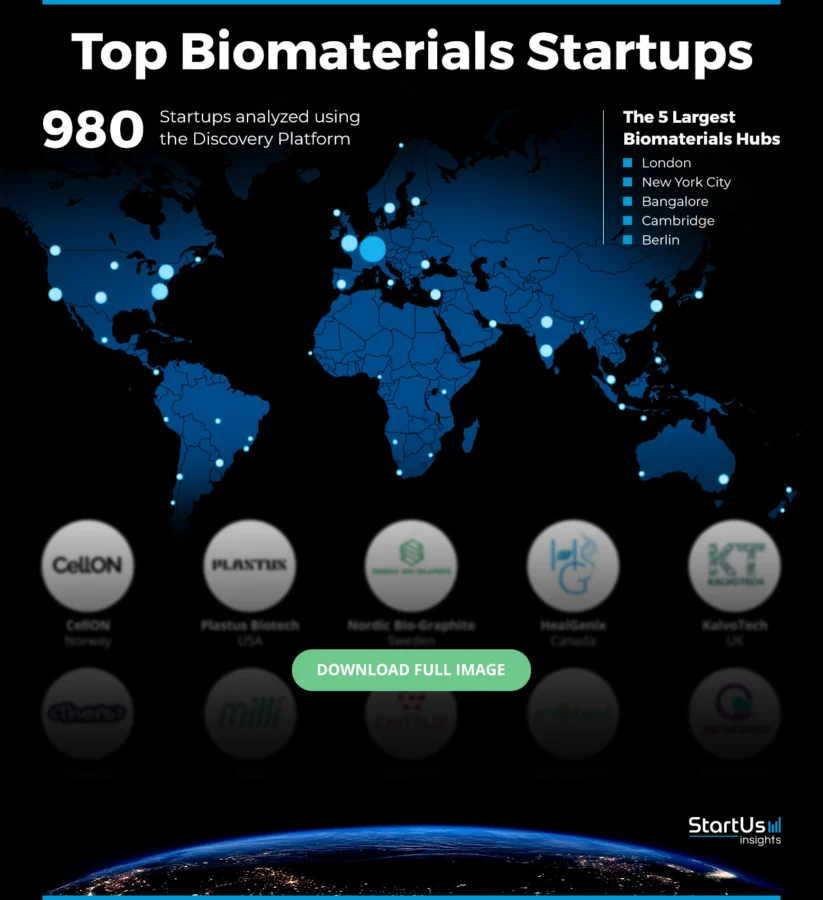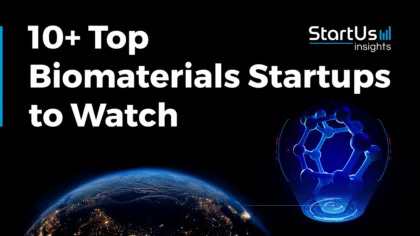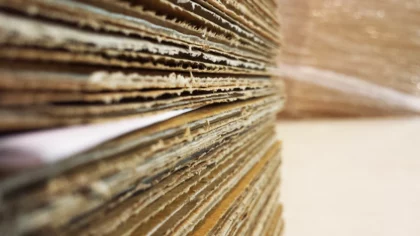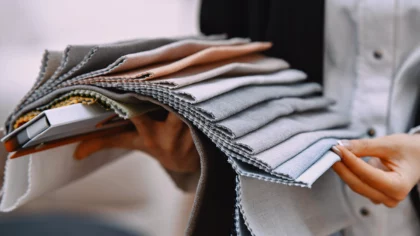Biomaterials companies are replacing fossil-based inputs with biodegradable, bio-based, and circular alternatives. From plant-derived polymers and mycelium composites to seafood waste upcycling and keratin-based regenerative materials, these innovations address environmental waste, toxic chemical dependency, and resource scarcity.
In this article, we spotlight 10 pioneering biomaterial startups positioned to shape industries in 2025. Selected for their breakthrough science, scalable applications, and environmental impact, these ventures are driving the shift toward greener materials across packaging, healthcare, textiles, and beyond.
Global Startup Heat Map highlights Emerging Biomaterials Companies to Watch
Through the Big Data & Artificial Intelligence (AI)-powered StartUs Insights Discovery Platform, covering over 7M+ startups, 20K+ technology trends, plus 150M+ patents, news articles & market reports, we identified 10 biomaterials startups.
The Global Startup Heat Map below highlights the biomaterials companies you should watch in 2025, as well as the geo-distribution of 980 startups & scaleups we analyzed for this research.
According to our data, we observe high startup activity in the US and UK, followed by India. The top 5 startup hubs for biomaterials are London, New York City, Bangalore, Cambridge, and Berlin.

Explore Emerging Biomaterials Startups to Watch in 2025
We hand-picked startups to showcase in this report by filtering for their technology, founding year, location, funding, and other metrics. These biomaterials startups work on solutions ranging from cell & gene therapy and human feedback to autonomous AI trading platforms and enterprise AI.
- CellON – Bio-Based Cellulose from Lignocellulose
- Plastus Biotech – Biodegradable PHA Bioplastics from Organic Waste
- Nordic Bio-Graphite – Carbon-Negative Bio-Based Graphite
- HealGenix – Biopolymer-Based Transparent Wound Dressings
- KalvoTech – Edible Hollow Fiber Membranes for Cell Cultivation
- Thero.it – 3D-Printed Bioplastic Toys from PLA
- Milli – Mycelium-Based Interior Materials from Local Waste
- Chitelix – Chitosan Biopolymers from Seafood Waste
- MPLUSHEAL – Keratin-Based Biomaterials from Human Hair Waste
- AgroRenew – Biodegradable Plastics from Crop and Food Waste
1. CellON
- Founding Year: 2023
- Location: Oslo, Norway
- Use For: Bio-based Cellulose
Norwegian startup CellON is developing a lignocellulose material platform to create bio-based materials using plants and wood. The platform replaces harmful substances like per- and poly-fluoroalkyl substances (PFAS) and plastics with biodegradable superfibers and nanogels.
These materials have customizable properties that are useful for oil and grease prevention, fire prevention, and antimicrobial barriers. These offer a sustainable alternative to traditional plastics and chemicals, reducing environmental pollution and waste accumulation.
2. Plastus Biotech
- Founding Year: 2023
- Location: Berkeley, California, USA
- Use For: Biodegradable Bioplastics
US-based startup Plastus Biotech converts industrial organic waste into polyhydroxyalkanoate (PHA) bioplastics through microbial fermentation. Unlike most bioplastics that are made from organic materials, the startup uses bacterial fermentation to manufacture its resins. This allows the startup’s solution to scale and not compete with food security.
Further, these bioplastics are fully biodegradable, decomposing naturally in environments rich in microorganisms, such as soil or marine settings. This approach results in zero end-of-life disposal costs without the need for specialized industrial composting facilities.
3. Nordic Bio-Graphite
- Founding Year: 2023
- Location: Stockholm, Sweden
- Use For: Fossil-free Graphite
Swedish startup Nordic Bio-Graphite produces carbon-negative bio-based graphite. Its patent-pending technology converts biomass into biochar and then further processes it to create fossil-free graphite. Key applications include lithium-ion battery anodes for electric vehicles, electrodes for electric arc furnaces in green steel production, and refractory materials used in high-temperature industrial processes. This provides a sustainable alternative to conventional carbon-intensive methods like mining or synthetic production.
4. HealGenix
- Founding Year: 2023
- Location: Ontario, Canada
- Use For: Wound Care Dressing
Canadian startup HealGenix creates transparent wound dressing made of biopolymers. This transparent bandaging allows monitoring the progress of patients’ wounds, such as diabetic foot ulcers or burn wounds. This reduces disturbances caused by multiple dressing changes and promotes faster recovery.
Additionally, the biocompatible material used in the bandage facilitates rapid tissue generation for accelerated wound closure and healing. The biopolymer also acts as a protective barrier from external contaminants while allowing proper airflow to support healing. This reduces the possibility of infections and supports overall healing.
5. KalvoTech
- Founding Year: 2023
- Location: Oxford, UK
- Use For: Cell Cultivation
UK-based startup KalvoTech manufactures Prokitein, a protein-based biopolymer for cell cultivation, bioprocessing, and textile applications. Prokitein is water-stable, mechanically tunable, and steam-in-place compatible. The startup uses this proprietary material to produce edible hollow fiber membranes (EHFMs) that mimic natural vascular systems.
These membranes enable nutrient and oxygen delivery in hollow fibre bioreactors and provide structural support for cells to attach, grow, and differentiate into muscle and fat tissues. This way, the startup aids the production of whole-cut cultivated meat in a single bioprocessing step.
Want to Explore 980+ Biomaterials Startups & Scaleups?
6. Thero.it
- Founding Year: 2024
- Location: Bologna, Italy
- Use For: Bioplastic Toys
Italian startup Thero.it makes bioplastic-based toys. It processes organic resources like corn starch, cassava, sugarcane, and others to derive polylactic acid (PLA) bioplastics. The PLA polyester is a suitable material for 3-dimensional (3D) printing of toys. 3D-printed toys further enable sustainable production and reduce waste. This way, Thero.it offers a sustainable alternative to plastic toys, reducing carbon emissions.
7. Milli
- Founding Year: 2024
- Location: Singapore, Singapore
- Use For: Mycelium-based Interior Materials
Singaporean startup Milli offers negative embodied carbon materials. It crafts materials from mycelium using traceable local waste such as paper and food waste. This diverts such waste from landfills and converts it into usable resources or new materials. Further, Milli employs carefully selected strains of fungi that grow with minimal climate control.
This reduces the need for energy-intensive temperature and humidity regulation. The startup eliminates disposables from production, replacing single-use cultivation bags and labware with reusable alternatives. Additionally, the startup employs treatments that don’t compromise the biodegradability of materials, ensuring a circular economy.
8. Chitelix
- Founding Year: 2023
- Location: Tunis, Tunisia
- Use For: Multifunctional Biopolymer
Tunisian startup Chitelix produces eco-friendly biopolymers, Chitin and Chitosan, from seafood industry waste. It derives Chitosan through the partial deacetylation of Chitin, naturally occurring in crustacean exoskeletons and fungi cell walls. Being more soluble and versatile, Chitosan is an alternative to synthetic chemical ingredients in multiple industries like agriculture, food and beverage, and more.
Moreover, the seafood waste collected by the startup is transformed into ingredients for its biofertilizers, contributing to a circular economy. By upcycling crustacean shells and other seafood byproducts, Chitelix prevents seafood waste from polluting and promotes a healthier marine ecosystem.
9. MPLUSHEAL
- Founding Year: 2024
- Location: Istanbul, Türkiye
- Use For: Human Hair-Based Keratin
Turkish startup MPLUSHEAL converts human hair waste into sustainable materials. It extracts keratin from human hair and transforms it into materials biocompatible for regenerative medicine, tissue engineering, trauma care, cell culture tools, and more. This enables hair waste to be reused instead of being incinerated or discarded.
10. AgroRenew
- Founding Year: 2023
- Location: Vincennes, Indiana, USA
- Use For: Biodegradable Plastics using Food Waste
US-based startup AgroRenew transforms food waste into biodegradable plastics. The startup works with farmers to collect crop waste, such as leftover watermelon. It reduces the waste’s water content and size using patented hammermill pulverizers and water extraction technology.
The resultant dust material is turned into biosource resin polymers used for making bioplastics. This reduces landfill waste and offers a sustainable alternative to conventional plastics.
Discover All Emerging Materials Startups
The materials startups showcased in this report are only a small sample of all startups we identified through our data-driven startup scouting approach. Download our free Materials Innovation Report for a broad overview of the industry or get in touch for quick & exhaustive research on the latest technologies & emerging solutions that will impact your company in 2025!









